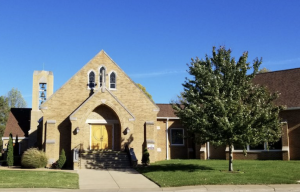Public safety, tech talk in Columbia
Columbia emergency response personnel were presented with lifesaver awards at the beginning of Monday’s Columbia City Council meeting.
Fittingly, it was announced later in the meeting that requests for proposal will be issued pertaining to the city’s public safety complex on North Main Street.
The facilities that house Columbia’s police, fire and EMS departments were topics of discussion during the latest municipal election cycle, and it seems as if steps are being taken to improve the complex to accommodate the growing city and public safety service departments.
The requests for proposal will be sent to area architecture firms for consideration.
Columbia City Administrator Doug Brimm explained that requests “will help us narrow down design firms that have worked on similar projects and help us select a firm that aligns with the city’s intended direction.”
Brimm added that the designer will “be responsible for coordinating meetings with all stakeholders of the city (police, EMS, etc.) to identify facility needs versus wants, while ensuring the facility is able to expand to meet (Columbia’s) needs as the city continues to grow.”
The council acted on several agenda items Monday night, including approval of adopting the Monroe County Multi-Hazard Mitigation Plan. With approval, the county now has all required municipal approval and may move forward with plans and applying for related grants.
Columbia City Engineer Chris Smith also addressed the council with bids for an emergency water main repair project on Camp Jackson Road.
The low bid of $295,000 was awarded to Haier Plumbing, Inc.
Smith explained that the water main, located in Cahokia, provides water to Columbia and is in need of metal casing to prevent further line breaks. He added that the project was already in the city budget for this year, but he wanted approval for a higher amount than expected due to an increase in material costs.
Smith said the project is not one that can be postponed due not only to its function but also its location near high-pressure propane lines and water-retaining areas.
Also at the meeting, Columbia Director of Information Technology James Mitchell continued a series of department reports that have become a regular part of city council meetings.
Mitchell, who became the city’s sole technology employee after working for Columbia on a project with a former employer, has been the driving force in collaborating with city departments to streamline technology within Columbia government.
“James has single-handedly turned things around,” Brimm added, noting that Mitchell is a “one-man show” and the city will need to consider a “help desk” role or similar position to help Mitchell with his increased workload.
Mitchell noted that he planned to budget for one additional city technology employee in the next fiscal year.
At the beginning of the meeting, two new Columbia Police Department officers were sworn in and one was promoted.
Officers Gary Craig and Joseph Roach took their oaths of office and current CPD officer Michael Barnett was promoted to sergeant.
In other city business last Tuesday, the Columbia Parks and Recreation Advisory Board met to discuss the rollout of Columbia’s comprehensive plan process and to accept bids for pickleball courts at Metter Park.
With input now being accepted by the public regarding the creation of a 20-year comprehensive plan for the city, Columbia Director of Community Development Scott Dunakey gave the board an overview of its role in the process in the coming months and during implementation of the plan.
Most notably, Dunakey explained the board’s function as an information gathering and steering committee for input and plans for Columbia’s parks and recreation options.
One aspect of Columbia parks that will be decided using the current fiscal year’s budget is the conversion of a tennis court at Metter Park into four pickleball courts.
The city council approved this conversion at a July meeting, but Dunakey explained that since the expected cost of the conversion is in excess of $25,000, the board will need to put the project out for bid.
The project is estimated to cost between $32,000 and $35,000.
Dunakey noted that the U.S. Pickleball Association website contains templates for converting a standard tennis court into four pickleball courts.
The bids will be opened Nov. 23. Work on the court conversion is expected to begin in the spring or as weather permits.






